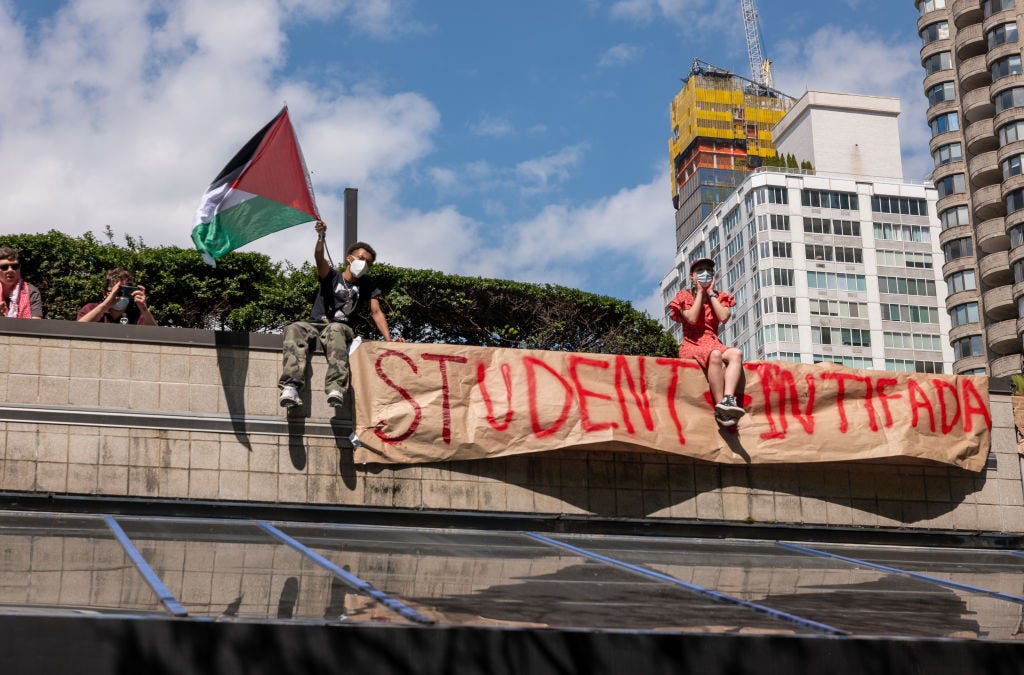...The
female tilt among anti-Israel student protesters is an underappreciated aspect of the pro-Hamas campus hysteria. True, when activists need muscle (to echo University of Missouri professor Melissa Click’s
immortal call during the 2015 Black Lives Matter protests), males are mobilized to
smash windows and doors or hurl projectiles at the police, for example. But the faces behind the masks and before the cameras are disproportionately female, as seen in this
recent gem from the Princeton demonstrations.
Why the apparent gender gap? One possible reason is that women constitute majorities of both student bodies and the metastasizing student-services bureaucracies that cater to them. Another is the sex skew in majors. The hard sciences and economics, whose students are less likely to take days or weeks out from their classes to party (correction: “stand against genocide”) in cool North Face tents, are still majority male. The humanities and soft social sciences, the fields where you might even get extra credit for your intersectional activism, are majority female. (Not surprisingly, males have spearheaded
recent efforts to guard the American flag against desecration.) In progressive movements, the default assumption now may be to elevate females ahead of males as leaders and spokesmen. But most important, the victim ideology that drives much of academia today, with its explicit enmity to objectivity and reason as white male constructs, has a female character.
Student protests have always been hilariously self-dramatizing, but the current outbreak is particularly maudlin, in keeping with female self-pity. “The university would rather see us dead than divest,”
said a member of the all-female press representatives of UCLA’s solidarity encampment on X. The university police and the Los Angeles Police Department “would rather watch us be killed than protect us.” (The academic Left, including these anti-Zionists, opposes police presence on campus; UCLA chancellor Gene Block apologized in June 2020 after the LAPD lawfully mustered on university property during the George Floyd race riots.) Command of language is not a strong point of these student emissaries. “There needs to be an addressment (
sic) of U.S. imperialism and its ties to the [University of California] system,”
said another UCLA encampment spokeswoman.
It was not too long ago when administrators started bringing in therapy dogs to campus libraries and dining halls to help a female-heavy student body cope with psychic distress, especially after the election of Donald Trump. “Trigger warnings” were implemented to protect female students from Ovid’s
Metamorphoses and other great works of literature. Campus discourse and its media echo chamber rang with accounts of the
mental-health crisis on campus, whose alleged sufferers were overwhelmingly female.
Par for the course, then, when the editors at the
Columbia Law Review (
majority female) adopted the rhetoric of trauma in demanding that Columbia Law School
hand out a universal pass for Spring 2024 coursework. A
May 1 action by the New York Police Department to evict violent trespassers from an administration building had left them, they wrote, “highly emotional,” “irrevocably shaken,” “unwell,” and “unable to focus”—in other words, displaying all the symptoms of Victorian neurasthenia.
It was not too long ago when a predominantly female professoriate, student population, and bureaucratic apparatus embraced the idea that students’ “safety” should be protected against the “hate speech” that allegedly jeopardized it. (Males, by contrast, place greater emphasis on academic freedom and truth-seeking, regardless of the alleged emotional consequences of intellectual inquiry.) Examples of dangerous speech included arguments that racial disparities are not caused by racism and that human beings cannot change their sex by proclamation.
Now, while still asserting their own unsafety, the pro-Hamas protesters have done an about-face when it comes to political disagreement and “safety,” at least where pro-Israel students are concerned. Nas Issa, a Palestinian alumna of Columbia University,
told the
New York Times that she saw a difference between feeling uncomfortable and feeling that you are in danger. Challenges to your identity or political ideology “can be personally affecting,” said Issa. “But I think the conflation between that and safety—it can be a bit misleading.”
It was also not too long ago when college campuses were shutting down or locking students in their dorms as an anti-Covid policy, notwithstanding overwhelming evidence showing that adolescents faced virtually no chance of serious Covid complications. This zero-risk policy, in its inability to balance costs and benefits rationally, was quintessentially female. It is fitting, therefore, that N95 masks have been repurposed as go-to accessories for the most up-to-date anti-settler-colonialist look. Females at the Columbia rally in front of Butler Library passed out the masks to the few participants not already wrapped up like mummies. When asked what the point was, one distributor answered, “to protect against Covid”—an answer that, sadly, could as easily be sincere as duplicitous.
Assuming the latter to be the case, hiding one’s face to escape accountability for one’s actions is the antithesis of manly virtue. The swaddled students would say that they have been forced into such precautions by the risk of “doxing.” But while a home address is properly private and should not be disclosed without permission, a face is public, and participation in public protest fair game for political accountability. The muffled freedom fighters are also aping Third World terrorists, of course, but the worst that might befall these revolutionary wannabes is rejection from their favored investment or consulting firm, not execution...











